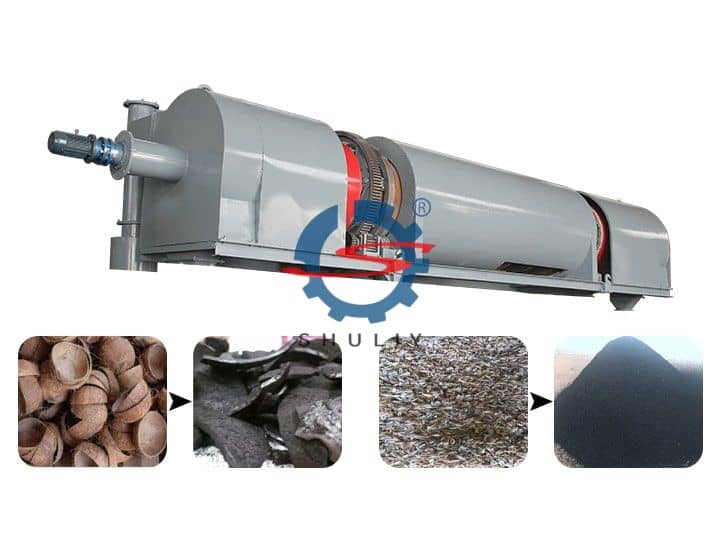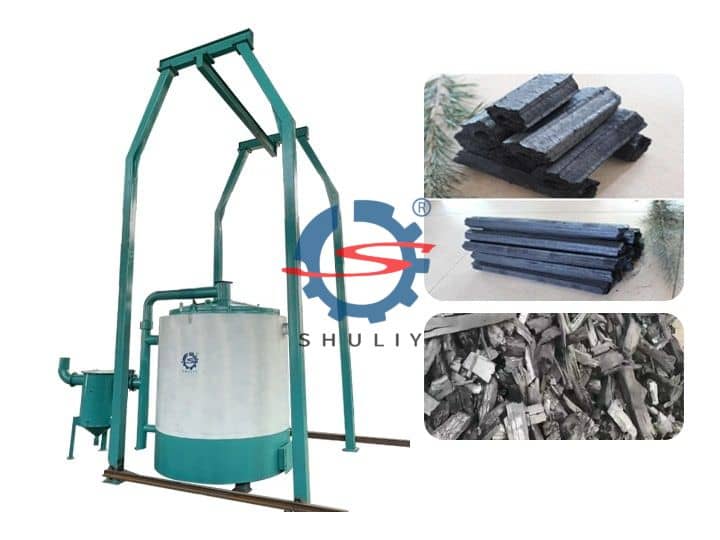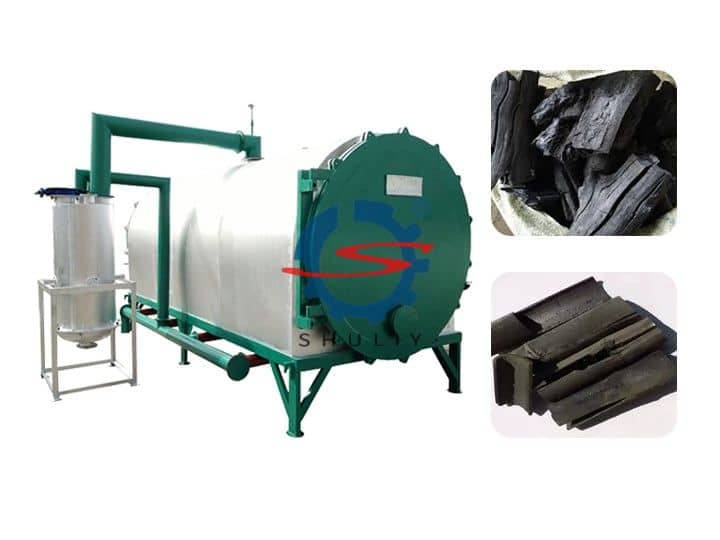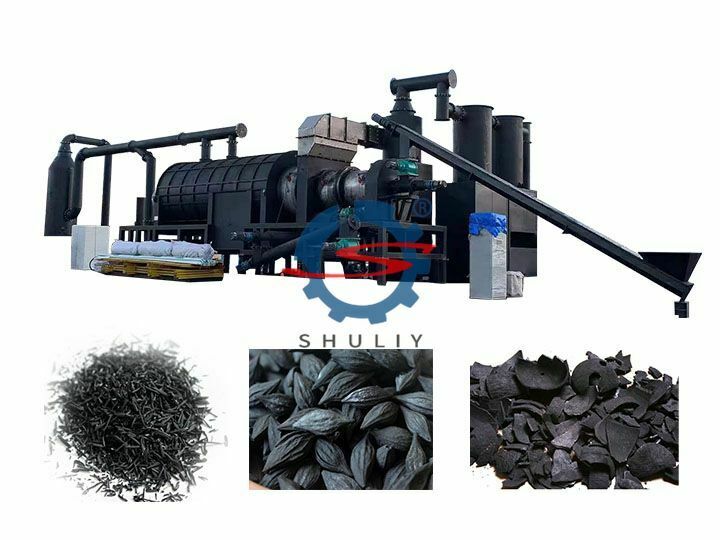Drehkarbonisierungsofen | Maschine zur Herstellung von Kokosnusskohle
| Modell | SL-CF800 |
| Durchmesser (mm) | 800 |
| Kapazität (kg/h) | 400-600 |
| Hauptleistung (kW) | 18.5 |
| Karbonisierungstemperatur (℃) | 500-800 |
| Lüfterleistung (kW) | 5.5 |
Rotationskohleofen ist eine hochautomatisierte Kohlenherstellungsanlage. Die Kohlenrohstoffe sind sehr vielfältig und bestehen größtenteils aus land- und forstwirtschaftlichen Abfällen, Fruchtschalen und Industrieabfällen. Erdnuss-Schalenkohle, Reisschalenkohle, Bambusspäne-Kohle, Kokosnussschalenkohle, Aprikosenschalenkohle, Kaffeesatzkohle usw. Sie werden durch den Kohlenisierungsmechanismus produziert. Das durch den kontinuierlichen Kohlenisierungsofen produzierte Kohlenmaterial ist sauber, ungiftig, rauchfrei und hat eine gute Plastizität. Kurz gesagt, die Marktprognose für den Rotationskohleofen ist vielversprechend. Kontaktieren Sie uns also schnell, um Produktpreise, Kategorien und Versandinformationen zu erhalten! Shuliy Maschinenhersteller eskortiert Ihre Produktion.
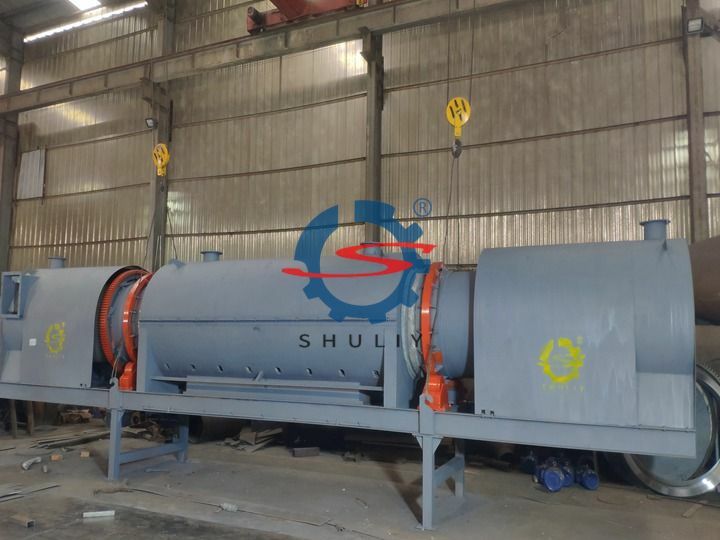
Rohstoffe für Drehkarbonisierungsöfen
Der Sägemehl-Karbonisierungsofen kann Rohstoffe wie Sägemehl, Reisschalen, Erdnussschalen, Pflanzenstrohhalme, Kokosnussschalen, Sonnenblumenschalen, Aprikosenschalen, Destillierkörner, Kaffeesatz usw. karbonisieren. Der Rohstoff des Biomasse-Karbonisierungsofens zeichnet sich durch kleine Mengen aus Materialien. Es handelt sich um Pulver und Partikel.

Wenn Ihre Rohstoffe große Holzspäne, Äste, Späne usw. sind, können sie die Anforderungen des Trommelverkohlungsofens nicht erfüllen. Keine Sorge, Sie müssen lediglich eine Schlagmühle vor dem Zuführsystem ausstatten, um die Rohstoffe zu erhalten, die den Produktionsanforderungen entsprechen. Darüber hinaus sollte die Feuchtigkeit der Holzspäne unter 20 % liegen. Sie können sich also entscheiden, sie natürlich zu trocknen oder einen Sägespänetrockner zu wählen, um die Feuchtigkeit des Rohmaterials zu reduzieren.

Funktionsprinzip des Rotationskarbonisierungsofens
1. Entfeuchtungsprozess
Dieser Prozess dient hauptsächlich dazu, die Feuchtigkeit aus dem Rohmaterial selbst zu entfernen. Mit dem schnellen Anstieg der Temperatur im Ofen nimmt die Feuchtigkeit der Biomasse ab. Tatsächlich ist dies auch der Prozess der Trocknung der Rohstoffe. Denn je niedriger die Luftfeuchtigkeit des Rohmaterials, desto höher ist die Karbonisierungsrate des Endprodukts. Dadurch ist auch die Holzkohlequalität besser.
2. Pyrolysestufe
Bei der Pyrolyse von Materialien wie Holzspänen und Kokosnussschalen entstehen Bestandteile wie Holzteer, Holzessig und brennbare Gase. Diese Produkte werden nacheinander getrennt und durch unsere Reinigungstanks gereinigt. Das brennbare Gas wird nach der Endreinigung zur Verbrennung als Brennstoff in die Brennkammer des Durchlaufverkokungsofens zurückgeführt.
3. Karbonisierungsstufe
Der kontinuierliche Karbonisierungsofen für Reisschalen muss nur einmal (1 Stunde) vorgeheizt werden. Die Karbonisierungszeit des Materials beträgt ca. 20-30 Minuten. Und es handelt sich um eine kontinuierliche Karbonisierungsanlage.
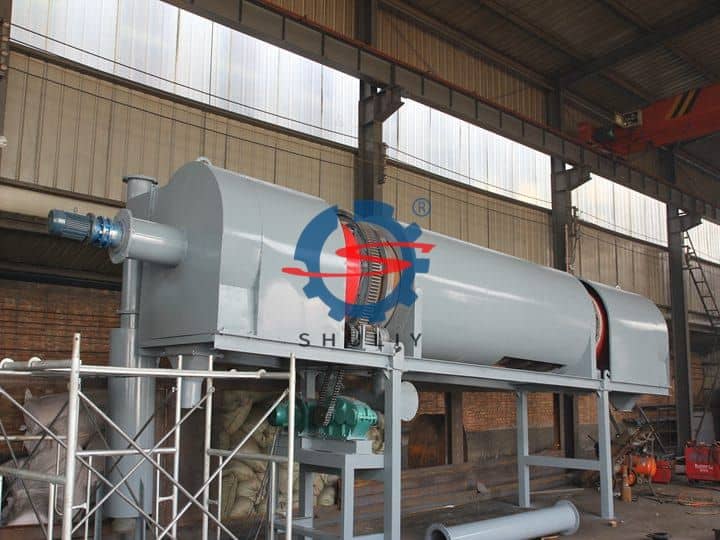
Struktur von Hocheffizientes CKokosnuss Hülse CKohleherstellung MMaschine
Die Walzenausrüstung verfügt über drei Funktionsbereiche: Vorwärmbereich, Hochtemperaturbereich und Niedertemperaturbereich. Die Karbonisierung findet in der Hochtemperaturzone statt, also im Hauptteil des Motors (aufgrund seiner Nähe zur Wärmequelle wird er auch Brennkammer genannt). An der Trommel befindet sich außerdem ein Beobachtungsloch, um die Verbrennung in der Brennkammer leicht beobachten zu können. Die Trommel wird durch Zahnräder und eine Öffnung zum Drehen angetrieben. Seine Geschwindigkeit wird jedoch durch den Getriebemotor gesteuert. Darüber hinaus verfügen unsere Motoren alle über eine einstellbare Frequenz, was sehr praktisch ist.
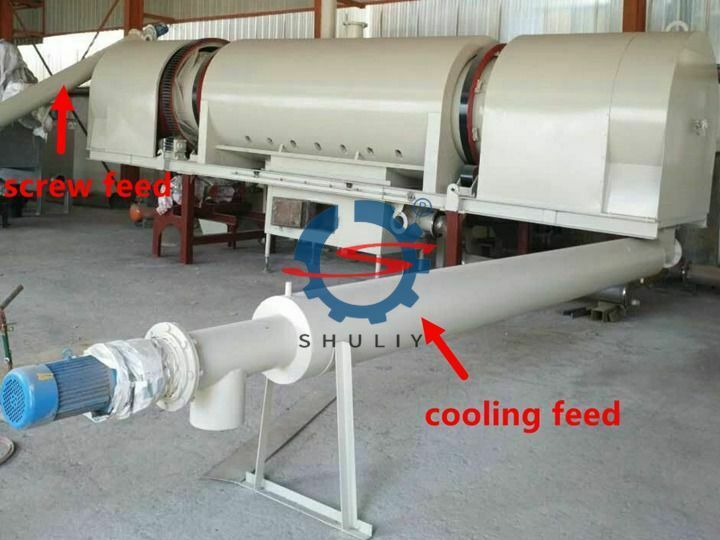
Ein- und Auslauf
Weil das Material des Reisschalen-Durchlaufkarbonisierungsofens leichter ist. Daher sind die Schneckenzuführ- und -austragsmethode sauberer und effizienter. Und die Abflussleitung ist ein doppelschichtiger Wasserzirkulationskühleffekt. Die Temperatur des fertigen Produkts liegt bei etwa 35 Grad.
Brenner
Der Reisschalen-Holzkohleofen verfügt über eine gute Luftdichtheit, viele Zünder und eine schnelle Heizgeschwindigkeit. Es muss mit Flüssiggas gezündet werden. Daher ist der gesamte Produktionsprozess umweltfreundlich.
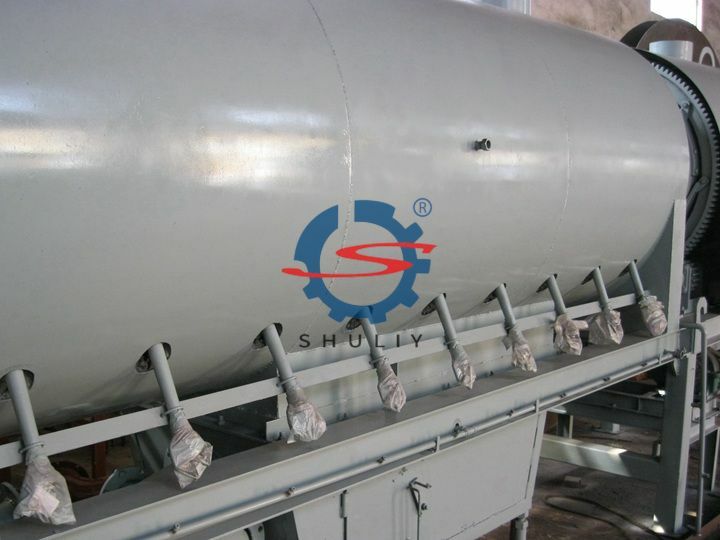
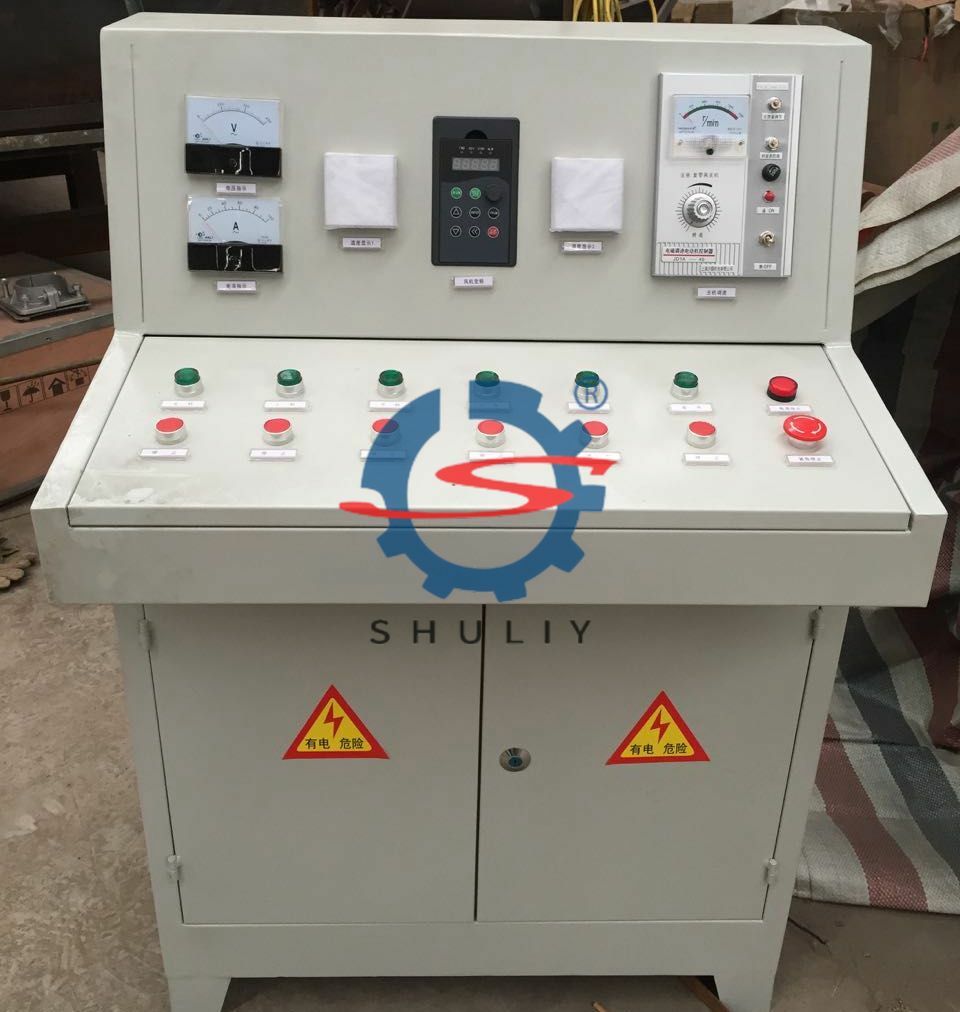
Verteilungsschrank
Am Stromverteilerschrank der Schwelofeneinheit befinden sich mehrere Tasten. Kunden können nicht nur Luftdruck, Strom und Temperatur innerhalb und außerhalb des Ofens einsehen. Und Ein-Knopf-Start, manuelle Geschwindigkeitsregulierung.
Getriebemotor
Steuern Sie die Geschwindigkeit der Hauptmaschine: Wenn das Rohmaterial hart ist, können Sie die Geschwindigkeit der Hauptmaschine verlangsamen, um die Karbonisierungszeit zu verlängern. Wenn das Rohmaterial etwas weich ist, können Sie die Geschwindigkeit erhöhen, um die Karbonisierungszeit zu verkürzen.
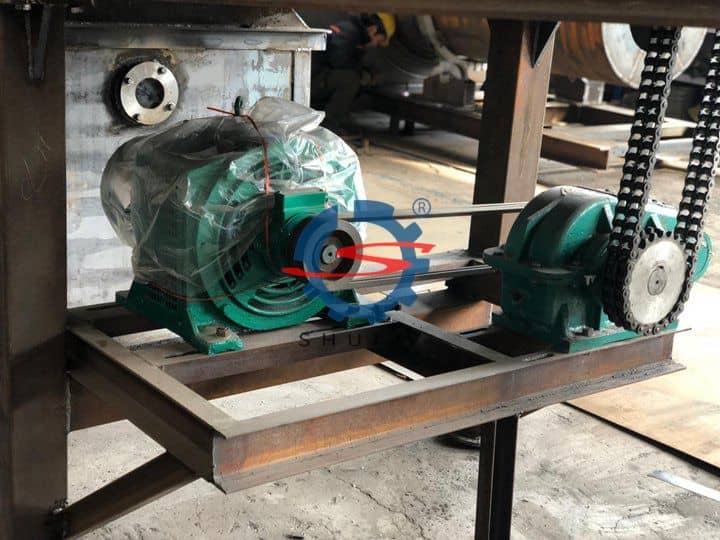
Wie wird Biomasse karbonisiert?
Wenn der Biomasse-Karbonisierungsofen eine bestimmte Temperatur erreicht, beginnen die Materialien im Ofen zu entfeuchten. Wenn die Temperatur etwa 300 Grad erreicht, beginnt das Material zu verkohlen. Wir alle kennen die drei Bedingungen, die die Verbrennung von Gegenständen erfüllen: eine Wärmequelle, brennbares Material und Sauerstoff. Denn der Biomasse-Karbonisierungsofen ist nahezu ein geschlossener Raum, also eine sauerstofffreie Umgebung. Daher kommt es im Ofenkörper zu einer Karbonisierung des Rohmaterials.
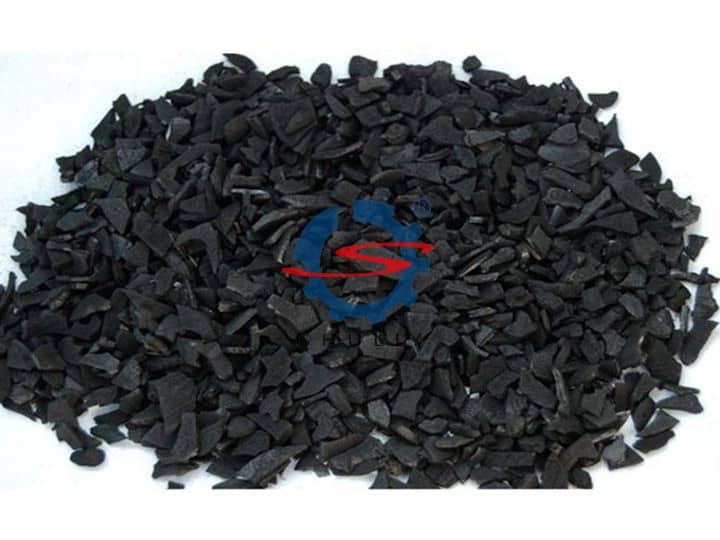
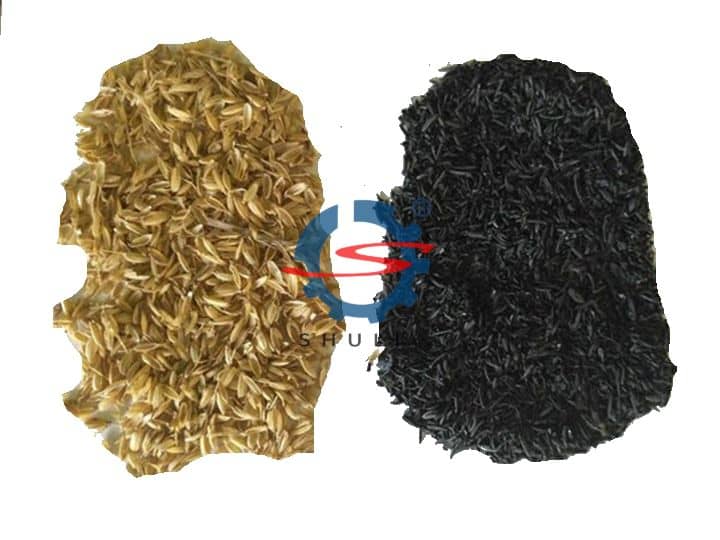
Parameter des kontinuierlichen Karbonisierungsofens
Der Modellname der Maschine zur Herstellung von Kokosnussschalen-Holzkohle und ihr Hauptkörperdurchmesser. Der Durchmesser seines Körpers ist anpassbar. Um den Kundenbedürfnissen gerecht zu werden, kann unser Werk Karbonisierungsöfen aus Edelstahlofenkörpern herstellen.
| Modell | SL-CF800 | SL-CF1000 | SL-CF1200 |
| Durchmesser (mm) | 800 | 1000 | 1200 |
| Kapazität (kg/h) | 400-600 | 800-1000 | 1200-1500 |
| Hauptleistung (kW) | 18.5 | 18.5 | 20 |
| Karbonisierungstemperatur (℃) | 500-800 | 500-800 | 500-800 |
| Lüfterleistung (kW) | 5.5 | 5.5 | 5.5 |
Video des rotierenden Erdnussschalen-Holzkohleofens
Unten sehen Sie ein Video eines Herstellers, der einen kontinuierlichen Karbonisierungsofen zur Herstellung von Holzkohle aus Erdnussschalen verwendet. Willkommen zum Zuschauen und Abonnieren.
Fertiges Produkt der Kokosnusskohle-Herstellungsmaschine
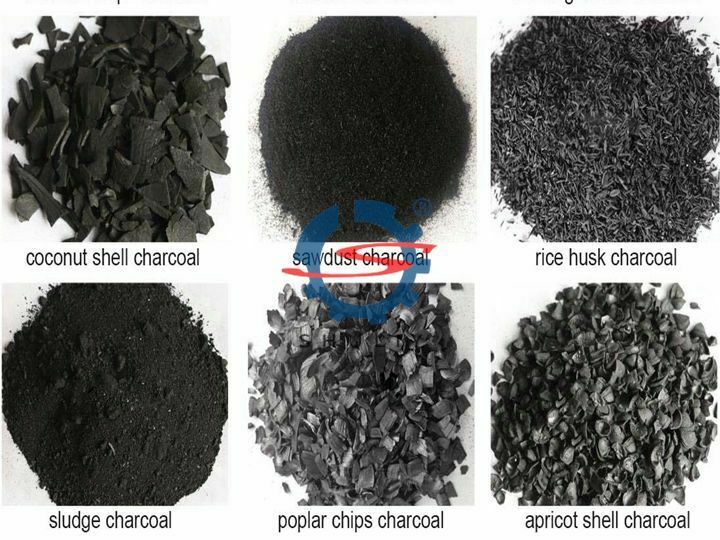
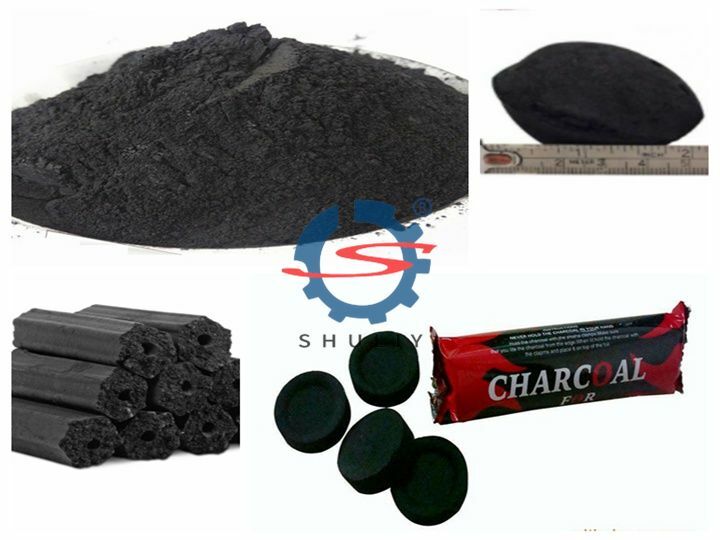
Die losen Rohstoffe wie Sägemehl und Reisschalen werden getrocknet, karbonisiert und gekühlt, um die benötigte Kohle zu werden. Daher können Kunden Fertigprodukte wie Reisschalenkohle, Kokosnussschalenkohle, Strohkohle und Fruchtschalenkohle direkt verkaufen. Kunden können sie auch zum Mahlen verwenden, um Kohlebriketts herzustellen. Dies schafft einen höheren Wert. Aufgrund des sauberen, ungiftigen, rauchfreien und energieeffizienten Kohlenstoffmaterials, das vom Rotations-Kohlenstoffisierungsofen produziert wird, hat es einen guten Markt und breite Perspektiven.

